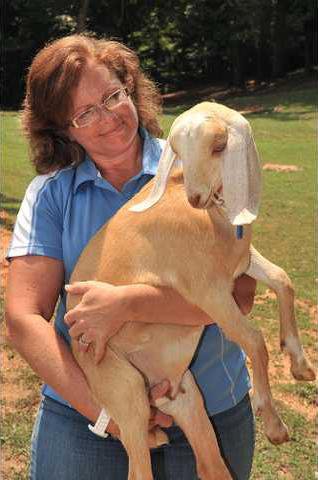They may be smaller in stature, but dairy goats are muscling in on cow territory. Goat products have been very popular in cultures abroad for many years, but the U.S. market for goat’s milk is just recently picking up steam. "There has definitely been an increase in the interest for fresh goat milk that is all natural or organic," said Deborah Andrews, a Gainesville resident who raises dairy goats. Andrews, owner of Angelic Andrews Acres, has been in the dairy goat business for several years. "My daughter (Ashley Andrews) and I saw a dairy goat show sanctioned by the Georgia Dairy Goat Association several years back and we were hooked," Andrews said. "We have had dairy goats for about six years now. We sell their milk and occasionally sell goats to families wanting continual dairy milk, but never for meat. "More families that I meet are wanting to be more self-sufficient by having their own dairy goat for milk." Depending on their age, dairy goats can produce around three quarts of milk per day. One reason for the new interest is the health benefits for individuals who have problems digesting cow’s milk. According to the American Dairy Goat Association, milk from a goat has less lactose than its cow counterpart, which makes it more easily digestible for some individuals who are lactose intolerant. It also has slightly higher levels of calcium and iron, than cow’s milk, the association says. According to the American Dietetic Association, goat’s milk also has less cholesterol, sodium, carbohydrates and sugars — but more protein — per serving. However, whole cow’s milk has fewer calories and fat than milk from a goat, the dietetic group reports. Like milk from a cow, goat’s milk can be used for drinking, baking and cooking. It can be used as a base for dairy products like cheese, butter, ice cream and yogurt. It can also be used to make body products like soap. For individuals who are considering making the switch from cow to goat milk, but are worried about the taste, the dairy goat association says that there "is no perceptible difference between the flavor of properly handled goat milk and that of cow milk." Andrews agrees. "We haven’t switched completely, but goat milk, when gathered correctly, is sweet and is about the same consistency as maybe 2 percent (cow’s milk)."
Gainesville resident raises her own goat herd for dairy; benefits are endless

